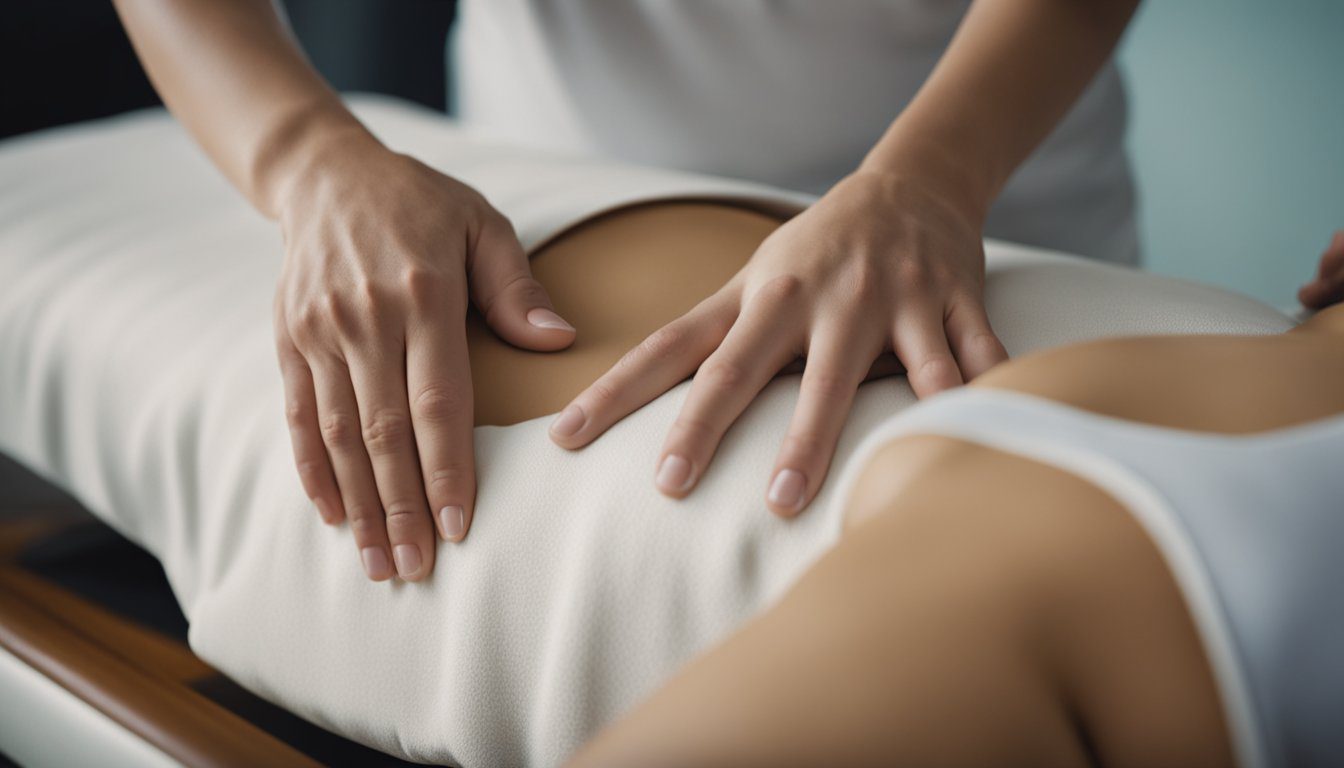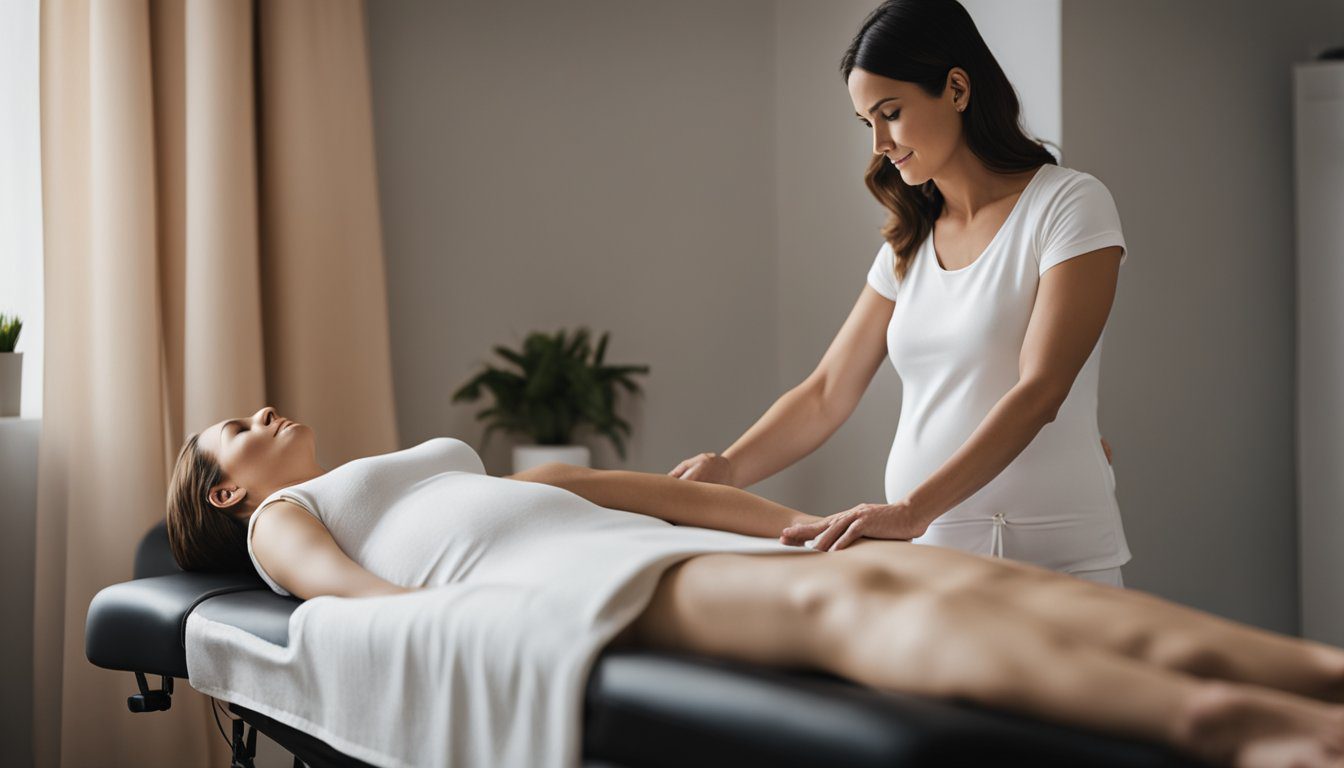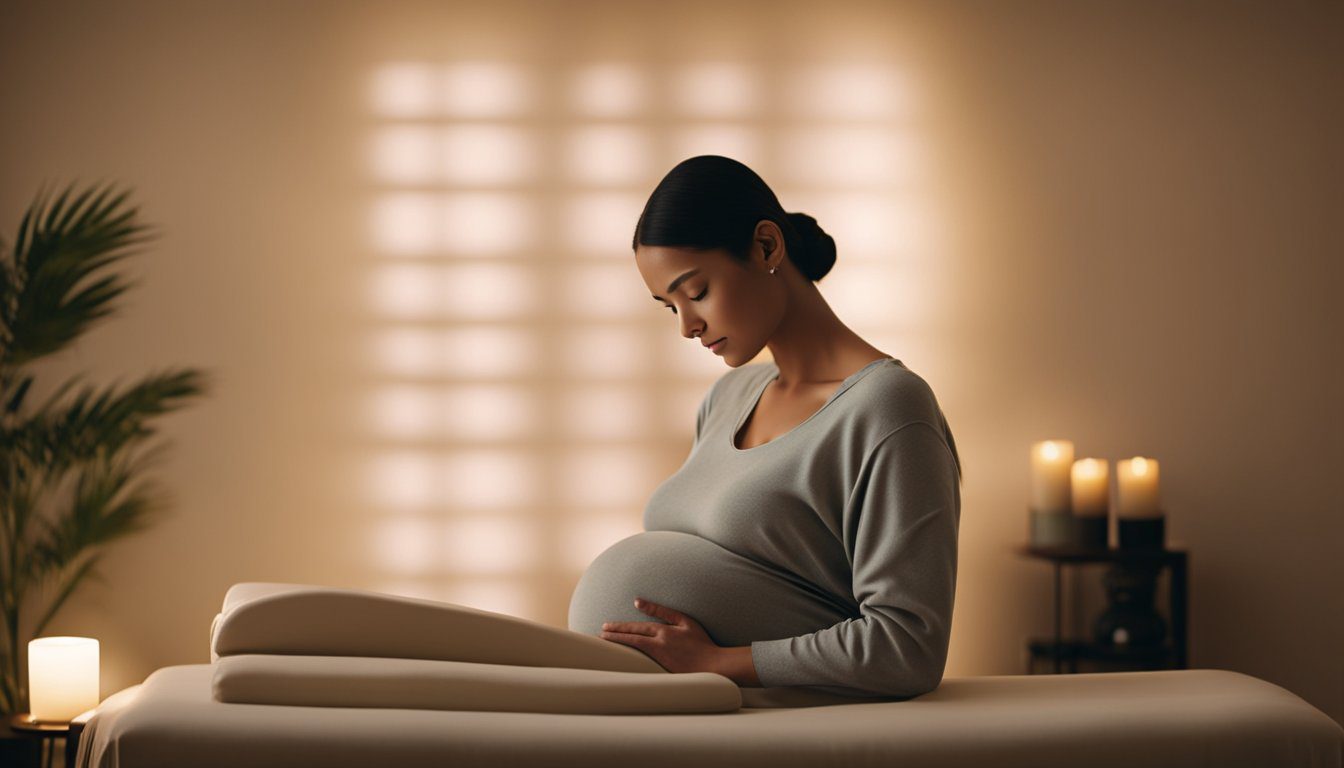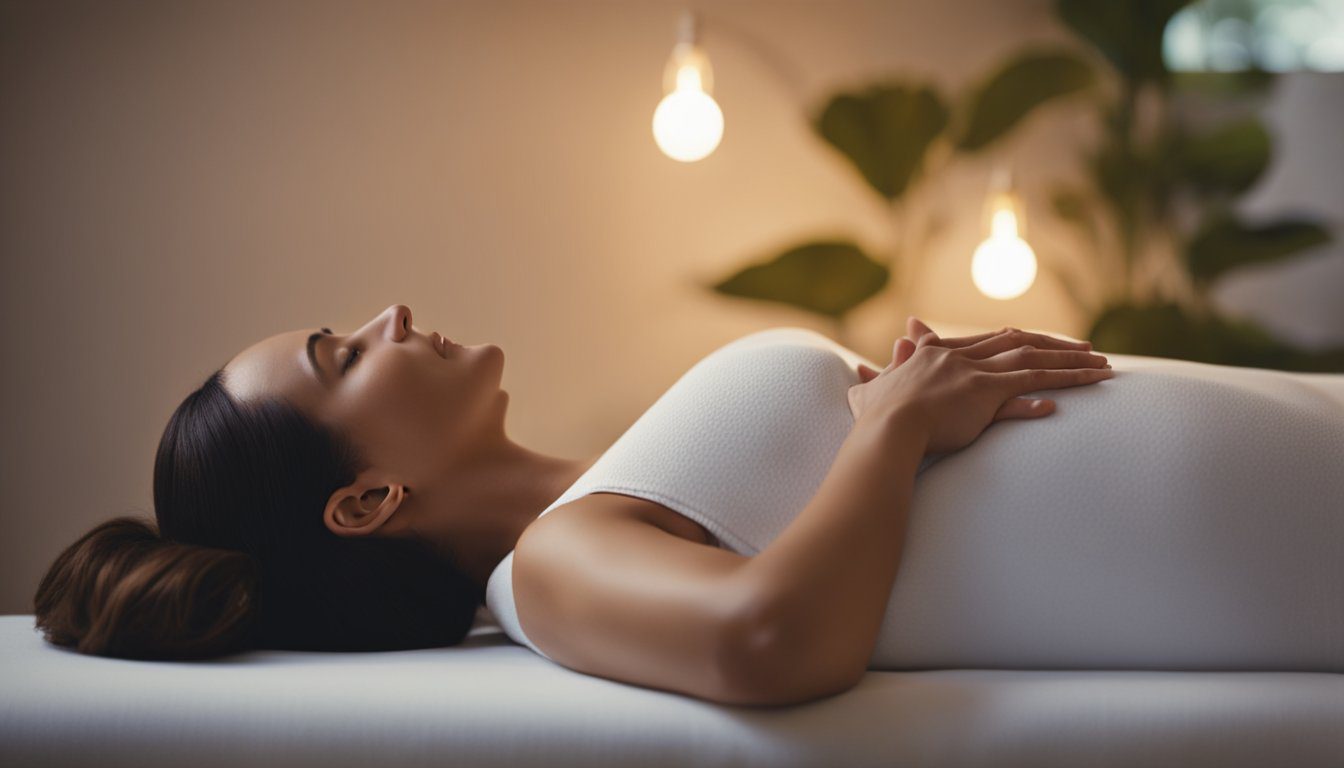Soothing Massage Relief for Expectant Mothers
Pregnancy can be an exciting yet challenging time for expectant mothers. As your body changes and grows, you might experience discomfort and stress. Luckily, there are ways to ease these issues and promote relaxation during pregnancy.
Prenatal massage therapy can offer numerous benefits for pregnant women. This special type of massage is designed to address the unique needs of expectant mothers. It can help with common pregnancy-related problems and improve your overall well-being. Let’s explore six reasons why you might want to consider getting a pregnancy massage.
1) Reduces Swelling

Pregnancy massage can help reduce swelling, a common issue for many expectant mothers. Swelling often affects the legs, ankles, and feet during pregnancy.
Swelling tends to worsen around the fifth month of pregnancy. It’s caused by increased fluid retention and pressure from your growing uterus.
A gentle massage can improve circulation and lymphatic drainage. This helps move excess fluid out of swollen areas, providing relief.
Regular massage sessions can keep swelling under control. You may notice less puffiness in your extremities after each treatment.
Drinking plenty of water alongside massage therapy can enhance its effects. Staying hydrated helps flush out excess fluids and minimize edema.
Pregnancy massage also promotes relaxation. When you’re relaxed, your body is better able to process fluids and reduce swelling naturally.
Ask your massage therapist to focus on areas where you experience the most swelling. They can use techniques specifically designed to address pregnancy-related fluid retention.
2) Alleviates Back Pain

Back pain is a common issue during pregnancy. As your baby grows, your center of gravity shifts, putting extra strain on your back muscles. This can lead to discomfort and aches in your lower back.
A pregnancy massage can help ease this pain. Skilled therapists use gentle techniques to target tense muscles and release built-up tension. This can provide much-needed relief from persistent backaches.
Massage helps improve blood flow to sore areas. Better circulation can reduce inflammation and promote healing in overworked back muscles. You may notice less stiffness and improved mobility after your massage session.
Regular massages can also help prevent future back pain. By keeping your muscles relaxed and flexible, you’re less likely to experience severe discomfort as your pregnancy progresses.
Prenatal massage is a safe and effective way to manage pregnancy-related back pain. Many women report significant improvement in their comfort levels after just a few sessions.
Remember to talk to your healthcare provider before starting any new treatments during pregnancy. They can advise you on the best approach for your specific needs and ensure it’s safe for you and your baby.
3) Enhances Sleep Quality

Many pregnant women struggle to get good sleep. Your growing belly and changing body can make it hard to find a comfy position.
Pregnancy massage can help you sleep better. It relaxes your muscles and eases tension in your body. This helps you feel more comfortable when you lie down.
The calming effects of massage last beyond the session itself. You may find yourself feeling more relaxed throughout the day and night.
Massage also reduces stress. Less stress means it’s easier for your mind to quiet down at bedtime. You might fall asleep faster and wake up less during the night.
Some pregnant women who get regular massages report sleeping more deeply. They wake up feeling more refreshed and ready for the day.
Better sleep is crucial during pregnancy. It helps your body recover and prepare for the challenges ahead. Getting enough rest can also improve your mood and energy levels.
4) Eases Muscle Tension

Pregnancy can put a lot of strain on your body. As your baby grows, your muscles work harder to support the extra weight.
Pregnancy massage can help relieve muscle tension and ease joint pain. This is especially helpful in the third trimester when your baby is growing quickly.
Regular massage sessions can target areas of discomfort. They help loosen tight muscles and reduce stiffness in your back, neck, and shoulders.
Your changing posture during pregnancy can lead to muscle aches. Massage techniques can address these issues, helping you feel more comfortable.
Many pregnant women experience leg cramps and swelling. Gentle massage can improve circulation and reduce these symptoms.
Massage also promotes relaxation of your entire body. This can help you feel less tense overall and may improve your sleep quality.
Remember to always check with your healthcare provider before getting a pregnancy massage. They can advise if it’s right for you and your baby.
5) Boosts Circulation

Pregnancy massage can help improve your blood flow. This is important because your body is working hard to support your growing baby.
Better circulation can reduce swelling in your hands, feet, and ankles. This swelling is common during pregnancy due to increased pressure on blood vessels.
Massage stimulates blood and lymph flow, which can help remove toxins from your body. This can make you feel more comfortable and energized.
Improved circulation can also help deliver more oxygen and nutrients to your tissues. This may help reduce muscle tension and fatigue.
You might notice less numbness and tingling in your extremities after a pregnancy massage. These sensations are often caused by poor circulation.
Regular massages throughout your pregnancy can help maintain good circulation. This can contribute to your overall well-being and may even benefit your baby’s growth.
6) Improves Mood

Pregnancy massage can give your mood a big boost. The gentle touch and relaxation can help you feel better emotionally.
During a massage, your body releases feel-good hormones like serotonin and dopamine. These chemicals lift your spirits and reduce stress.
Many pregnant women report feeling happier and more positive after a massage. The calming effects can last for hours or even days.
Massage also helps ease physical discomfort that may be affecting your mood. Less pain and tension often leads to a brighter outlook.
You may find it easier to cope with the ups and downs of pregnancy after a soothing massage. The quiet time allows you to relax and refocus.
Regular massages can improve your sleep quality. Better sleep often results in a more stable mood and increased energy during the day.
Pregnancy massage gives you a chance to connect with your changing body in a positive way. This can boost your confidence and self-image.
Understanding Pregnancy Massage

Pregnancy massage offers unique benefits and requires special safety considerations. This gentle therapy can help ease discomfort and promote relaxation during pregnancy.
Benefits for Expectant Mothers
Pregnancy massage can provide significant relief for many common pregnancy-related issues. It helps reduce muscle tension, especially in the lower back, hips, and legs. This can ease the strain caused by your changing body.
The therapy also promotes better sleep and reduces stress. Many women report feeling more relaxed and less anxious after sessions.
Massage can improve circulation, potentially reducing swelling in your hands and feet. It may also help alleviate headaches and boost your overall mood.
Some studies suggest regular massages might lead to easier labor and shorter hospital stays. However, more research is needed to confirm these findings.
Safety Considerations
While pregnancy massage can be beneficial, it’s crucial to take certain precautions. Always consult your healthcare provider before starting any massage therapy, especially if you have a high-risk pregnancy.
Choose a certified prenatal massage therapist who understands the specific needs of pregnant women. They should use appropriate techniques and positioning to ensure your comfort and safety.
Avoid massage during the first trimester, as this is a sensitive period for fetal development. After that, lying on your side with proper support is usually the safest position.
Certain areas should be avoided during pregnancy massage, including pressure points on the ankles and wrists. These spots are thought to potentially stimulate contractions.
If you experience any discomfort or unusual symptoms during or after a massage, stop the session and contact your healthcare provider immediately.
Techniques Used in Pregnancy Massage

Pregnancy massage uses specific methods to help ease discomfort and promote relaxation. These techniques are adapted to be safe and effective for expectant mothers.
Swedish Massage
Swedish massage is a gentle approach often used in prenatal massages. It involves long, flowing strokes to relax muscles and improve circulation. The therapist uses light to medium pressure, focusing on areas that commonly cause discomfort during pregnancy.
Key elements of Swedish massage for pregnant women include:
- Effleurage: Gliding strokes to warm up muscles
- Petrissage: Kneading motions to release tension
- Friction: Circular movements to increase blood flow
This technique can help reduce swelling, ease back pain, and improve sleep quality. Many women find Swedish massage soothing and report feeling more relaxed afterward.
Deep Tissue Massage
Deep tissue massage can be modified for pregnancy to address specific areas of tension. It uses firm pressure and slow strokes to target deeper layers of muscle and connective tissue. The therapist avoids sensitive areas and adjusts pressure based on your comfort level.
Benefits of deep tissue massage during pregnancy may include:
- Relief from chronic muscle tension
- Improved posture
- Reduced sciatic pain
One popular technique is the double hip squeeze. You lean forward while the therapist applies pressure to both sides of your hips. This can help alleviate lower back pain and pelvic discomfort.
Always communicate with your massage therapist about pressure and comfort throughout the session. They can adjust their techniques to best suit your needs and ensure a safe, beneficial experience.
Choosing a Qualified Pregnancy Massage Therapist

Finding the right therapist is key for a safe and effective pregnancy massage. You’ll want someone with proper training and experience working with pregnant clients.
Certification and Training
Look for therapists with specific prenatal massage certifications. These programs teach safe techniques for different pregnancy stages. Ask about their education in pregnancy anatomy and physiology.
Check if they’ve completed a prenatal massage training course. This ensures they know how to position you safely and avoid risky pressure points.
Experienced therapists stay up-to-date on best practices. They should be able to explain how they adapt techniques for each trimester.
Questions to Ask During Consultation
Before booking, have a chat with potential therapists. Ask about their experience with pregnant clients. Find out how many prenatal massages they do each month.
Request details on their approach to pregnancy massage. They should describe safety measures like proper positioning and pressure adjustments.
Inquire about any specialized equipment they use, such as pregnancy pillows. Ask how they handle common pregnancy issues like swelling or back pain.
Discuss any health concerns you have. A good therapist will ask about your medical history and pregnancy progress.
